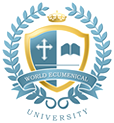Why Choose WUE
Why choose the Ecumenical University
Today, society in general, and knowledge in particular, increasingly exposes new educational demands that require professionals with a multidisciplinary background capable of dealing with them.

These new educational needs in turn have generated new fields and educational contexts, different from the conventional ones, in which specialized educational interventions are needed, led by professionals with specific skills. Skills that generally do not have people who soon finish their university studies; and especially those who have never received pedagogical training.
Precisely today, there is a growing number of professionals from different fields who in many countries are dedicated or want to devote themselves to teaching and have not had the opportunity or opportunity to receive training in this regard.
These studies aim to meet the needs of these professionals and act as a relevant service for our society. The intention is to improve the education sector by improving, in turn, the student learning process.
In this way, WUE a training that strives for the autonomy of learning without neglecting the constant, flexible and adjusted interaction to the needs of teachers in training.
The program has an infrastructure composed of EAV – (Virtual Learning Environment) and a very elaborate academic management, which allows to offer an adequate service, thus facilitating the teaching-learning process. WUE considers the incorporation of Information and Communication Technologies (ICT) as an essential part of training. and as an intrinsic part of his future professional work. In this sense, ICTs are used in curricula in two training plans:
• An educational plan to improve, enrich and increase the explanatory power of teachers and expand student learning through the EAV – Virtual Learning Environment where students access an online library, synchronous and asynchronous discussion spaces;
• Another pedagogical plan, where ICTs integrate the training process into continuous learning through practice, in which the task resolution process is considered in itself a process of creation, innovation and knowledge management.


